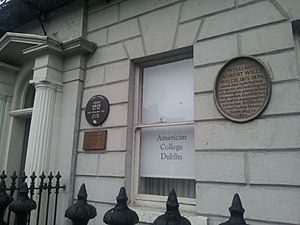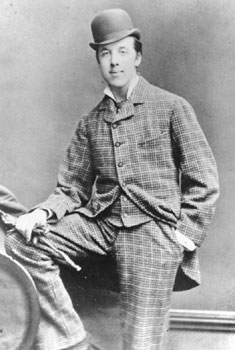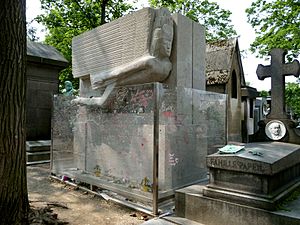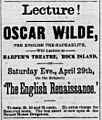Oscar Wilde facts for kids
Quick facts for kids
Oscar Wilde
|
|
|---|---|
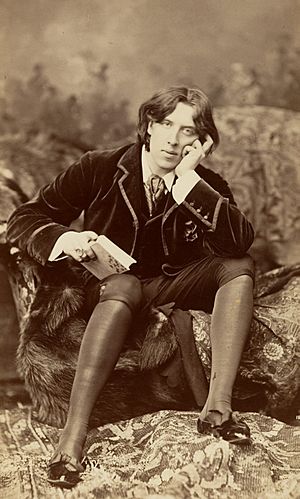
Photograph taken in 1882 by Napoleon Sarony
|
|
| Born | Oscar Fingal O'Flahertie Wills Wilde 16 October 1854 Dublin, Ireland |
| Died | 30 November 1900 (aged 46) Paris, France |
| Resting place | Père Lachaise Cemetery |
| Occupation |
|
| Language | English, French |
| Nationality | Irish |
| Education | Portora Royal School |
| Alma mater | |
| Period | Victorian era |
| Genre |
|
| Literary movement | Aestheticism |
| Notable works | |
| Spouse | |
| Children |
|
| Relatives |
|
| Signature | |
 |
|
Oscar Fingal O'Flahertie Wills Wilde (16 October 1854 – 30 November 1900) was an Irish writer, poet and playwright. He wrote The Picture of Dorian Gray, and the plays Salomé, The Importance of Being Earnest, An Ideal Husband, and Lady Windermere's Fan.
Contents
Early life
Oscar Wilde was born at 21 Westland Row, Dublin (now home of the Oscar Wilde Centre, Trinity College), the second of three children born to an Anglo-Irish couple: Jane, née Elgee, and Sir William Wilde. Oscar was two years younger than his brother, William (Willie) Wilde.
Jane Wilde was a niece (by marriage) of the novelist, playwright and clergyman Charles Maturin (1780–1824), who may have influenced her own literary career. She wrote poetry and was a lifelong Irish nationalist.
Sir William Wilde was Ireland's leading oto-ophthalmologic (ear and eye) surgeon and was knighted in 1864 for his services as medical adviser and assistant commissioner to the censuses of Ireland. He also wrote books about Irish archaeology and peasant folklore. A renowned philanthropist, his dispensary for the care of the city's poor at the rear of Trinity College, Dublin (TCD), was the forerunner of the Dublin Eye and Ear Hospital, now located at Adelaide Road.
Until he was nine Wilde was educated at home, where a French nursemaid and a German governess taught him their languages. He joined his brother Willie at Portora Royal School in Enniskillen, County Fermanagh, which he attended from 1864 to 1871. His fellow students had regarded him as a "prodigy" for his ability to speed read, claiming that he could read two facing pages simultaneously and consume a three-volume book in half an hour, retaining enough information to give a basic account of the plot. He excelled academically, particularly in the subject of Classics, in which he ranked fourth in the school in 1869. His aptitude for giving oral translations of Greek and Latin texts won him multiple prizes. He was one of only three students at Portora to win a Royal School scholarship to Trinity in 1871.
University education: 1870s
At Trinity, Wilde established himself as an outstanding student: he came first in his class in his first year, won a scholarship by competitive examination in his second and, in his finals, won the Berkeley Gold Medal in Greek, the University's highest academic award. He was encouraged to compete for a demyship (a half-scholarship worth £95 (£6,300 today) per year) to Magdalen College, Oxford – which he won easily.
At Magdalen, he read Greats from 1874 to 1878 and became particularly well known for his role in the aesthetic and decadent movements. He wore his hair long, openly scorned "manly" sports though he occasionally boxed, and he decorated his rooms with peacock feathers, lilies, sunflowers, blue china and other objets d'art.
Wilde won the 1878 Newdigate Prize for his poem "Ravenna", which reflected on his visit there in the previous year. In November 1878, he graduated with a double first in his B.A. of Classical Moderations and Literae Humaniores (Greats).
Literary career
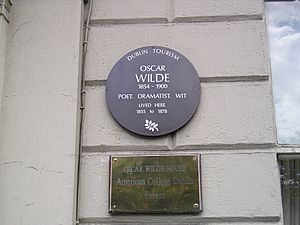
In London, Wilde worked as a journalist for four years. Known for his biting wit, flamboyant clothes, and glittering conversation, he was one of the best known personalities of the day. It was his only novel, The Picture of Dorian Gray, which brought him full recognition. Then he turned to writing drama. He wrote Salomé in French in Paris in 1891, but it was refused a licence. Despite this, Wilde produced four society comedies in the early 1890s, which made him one of the most successful playwrights of late Victorian London.
At the height of his fame and success he wrote his masterpiece play - The Importance of Being Earnest. It was first performed on 14 February 1895 at St. James's Theatre in London.
Death
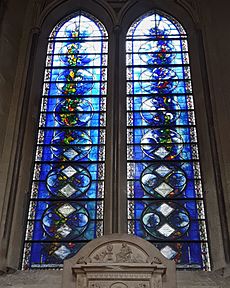
Wilde was initially buried in the Cimetière de Bagneux outside Paris; in 1909 his remains were disinterred and transferred to Père Lachaise Cemetery, inside the city. His tomb there was designed by Sir Jacob Epstein.
Honours
On 14 February 1995, Wilde was commemorated with a stained-glass window at Poets' Corner in Westminster Abbey. The memorial, above the monument to Geoffrey Chaucer, was unveiled by his grandson Merlin Holland.
Personal life
Wilde was bisexual. He was married to Constance Lloyd, daughter of Horace Lloyd, a wealthy Queen's Counsel. The couple had two children.
Quotations
- I have the simplest tastes. I am always satisfied with the best.
- A thing is not necessarily true because a man dies for it.
- A poet can survive everything but a misprint.
- We have really everything in common with America nowadays, except, of course, language.
- On George Bernard Shaw: An excellent man: he has no enemies, and none of his friends like him.
- Anybody can make history. Only a great man can write it.
- Be yourself, everyone else is taken.
Famous books
Prose
- The Canterville Ghost (1887)
- The Happy Prince and Other Stories (1888)
- Lord Arthur Savile's Crime and Other Stories (1891)
- Intentions (1891)
- The Picture of Dorian Gray (1891)
- A House of Pomegranates (1891)
- The Soul of Man under Socialism (First published in the Pall Mall Gazette, 1891, first book publication 1904)
- De Profundis (1905)
- The Letters of Oscar Wilde (1960) This was rereleased in 2000, with letters uncovered since 1960, and new, detailed, footnotes by Merlin Holland.
- Teleny or The Reverse of the Medal (Paris, 1893)
Plays
- Vera; or, The Nihilists (1880)
- The Duchess of Padua (1883)
- Lady Windermere's Fan (1892)
- A Woman of No Importance (1893)
- Salomé (French version) (1893, first performed in Paris 1896)
- Salomé: A Tragedy in One Act: Translated from the French of Oscar Wilde by Lord Alfred Douglas, illustrated by Aubrey Beardsley (1894)
- An Ideal Husband (1895) (text)
- The Importance of Being Earnest (1895)
- La Sainte Courtisane and A Florentine Tragedy Fragmentary. First published 1908 in Methuen's Collected Works
Images for kids
-
Photograph by Elliott & Fry of Baker Street, London, 1881
-
1881 caricature in Punch, the caption reads: "O.W.", "Oh, I eel just as happy as a bright sunflower, Lays of Christy Minstrelsy, "Æsthete of Æsthetes!/What's in a name!/The Poet is Wilde/But his poetry's tame."
-
No. 34 Tite Street, Chelsea, the Wilde family home from 1884 to his arrest in 1895. In Wilde's time this was No. 16 – the houses have been renumbered.
-
Wilde by W. & D. Downey of Ebury Street, London, 1889
-
Plaque commemorating the dinner between Wilde, Arthur Conan Doyle and the publisher of Lippincott's Monthly Magazine on 30 August 1889 at the Langham Hotel, London, that led to Wilde writing The Picture of Dorian Gray
-
Lake Windermere in northern England where Wilde began working on his first hit play, Lady Windermere's Fan (1892), during a summer visit in 1891.
-
The Marquess of Queensberry's calling card with the handwritten offending inscription "For Oscar Wilde posing Somdomite [sic]". The card was marked as exhibit 'A' in Wilde's libel action.
-
Oscar Wilde's visiting card after his release from gaol
See also
 In Spanish: Oscar Wilde para niños
In Spanish: Oscar Wilde para niños


